Governance of tenure newsletter
Albania
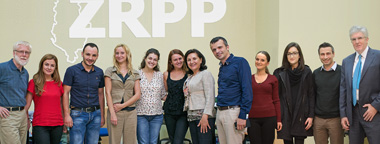 The Immovable Property Registration Office in Albania has introduced several innovative solutions to help professionals make the best use of information technology in line with the Voluntary Guidelines. The team working on information technology took the initiative to share disaggregated data, including statistics, and information on the benefits of these innovations to help decision-makers. The team considered how an effective strategy can improve communication with internal and external users and serve to achieve the office’s goals and promote activities related to land administration and land management. The team explored challenges, opportunities and priorities, and how to formulate key messages in newsletters.
The Immovable Property Registration Office in Albania has introduced several innovative solutions to help professionals make the best use of information technology in line with the Voluntary Guidelines. The team working on information technology took the initiative to share disaggregated data, including statistics, and information on the benefits of these innovations to help decision-makers. The team considered how an effective strategy can improve communication with internal and external users and serve to achieve the office’s goals and promote activities related to land administration and land management. The team explored challenges, opportunities and priorities, and how to formulate key messages in newsletters.
Albania - Property Rights Just a ‘Click’ Away.
Armenia
A national workshop brought together 35 participants from government, civil society, private sector and academia to discuss the use of the Voluntary Guidelines. Armenia has a well-developed legal framework for land administration and registration but the review showed that constraints still persist. The participants suggested improvements in land monitoring and land valuation where the methodology is outdated. They identified the importance of helping farmers understand the importance of updating ownership records: the State provides support to the holders of the formal land titles for small and medium-sized farms but some farmers are not entitled to the support because they did not update the ownership records when they inherited the farms. Cooperatives were suggested as a way to help develop family farms expand their production for the market. The workshop was held in Yerevan during 23-24 November 2015 and was organized and funded by FAO.
Georgia
Formal registration of landownership to agricultural land; the rights of investors to build versus the rights of society to regulate land use through spatial planning; women’s rights to land and other natural resources; and the use of land consolidation for addressing the structural problems of small and fragmented farms. These topics were the subjects of lively discussion at the national workshop on the Voluntary Guidelines, which was held in Tbilisi during 19-20 November 2015. The workshop was attended by over 30 participants from government, civil society, private sector and academia. It was organized and funded by FAO.
Kyrgyzstan
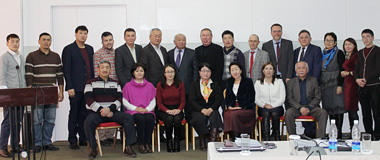 Around 40 participants from government, civil society and academia participated in a national workshop on the Voluntary Guidelines in Bishkek during 10-11 December 2015. One problem identified is that private houses in forest and pasture areas are registered as part of the surrounding state land and so people do not have registered rights to these houses. The participants discussed the possibility of reducing transaction costs for vulnerable people. They identified the need to clarify the overall land policy where it is unclear and to resolve overlaps between public agencies. The participants prepared recommendations following their discussions. The workshop was organized and funded by FAO.
Around 40 participants from government, civil society and academia participated in a national workshop on the Voluntary Guidelines in Bishkek during 10-11 December 2015. One problem identified is that private houses in forest and pasture areas are registered as part of the surrounding state land and so people do not have registered rights to these houses. The participants discussed the possibility of reducing transaction costs for vulnerable people. They identified the need to clarify the overall land policy where it is unclear and to resolve overlaps between public agencies. The participants prepared recommendations following their discussions. The workshop was organized and funded by FAO.
Sierra Leone
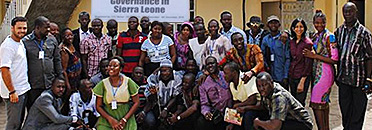 Strengthening forest tenure systems and governance in Sierra Leone was the theme of a 5-day training exercise held in Bo during 30 November to 4 December 2015. The training allowed participants to have a better understanding of principles for improving governance of forest tenure and to gain experience with tools to analyze tenure systems and develop tenure reform activities. About 30 people participated from the Forestry Division of the Ministry of Agriculture, Forestry and Food Security, non-governmental and civil society organizations and the private sector. The training is expected to support complementary activities, including the development of a national strategy and concept for community-based forestry. It follows an earlier assessment of existing tenure regimes, which identified the need to strengthen capacity within the forestry sector. The training was part of support for the Voluntary Guidelines, with technical assistance provided by FAO and financial support from Germany.
Strengthening forest tenure systems and governance in Sierra Leone was the theme of a 5-day training exercise held in Bo during 30 November to 4 December 2015. The training allowed participants to have a better understanding of principles for improving governance of forest tenure and to gain experience with tools to analyze tenure systems and develop tenure reform activities. About 30 people participated from the Forestry Division of the Ministry of Agriculture, Forestry and Food Security, non-governmental and civil society organizations and the private sector. The training is expected to support complementary activities, including the development of a national strategy and concept for community-based forestry. It follows an earlier assessment of existing tenure regimes, which identified the need to strengthen capacity within the forestry sector. The training was part of support for the Voluntary Guidelines, with technical assistance provided by FAO and financial support from Germany.
Tajikistan
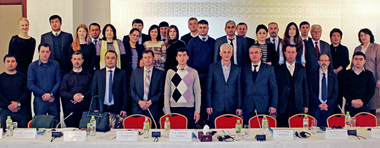 A national workshop on the Voluntary Guidelines was held in Dushanbe during 26-27 November 2015. About 45 representatives from government, civil society, private sector, academia and the EU Delegation participated. The discussions identified the positive aspects of the legal framework for land administration and the reforms that are being undertaken to introduce the possibility to trade and exchange use rights and to create a more favourable environment for investment. Gaps were identified, including the need to follow up the 2012 Land Code with specific actions. Other topics discussed were the introduction of private ownership for rural household parcels; poverty, which is a concern in rural areas and affects men and women equally; and the role of cooperatives to support family farms. The workshop was organized and funded by FAO.
A national workshop on the Voluntary Guidelines was held in Dushanbe during 26-27 November 2015. About 45 representatives from government, civil society, private sector, academia and the EU Delegation participated. The discussions identified the positive aspects of the legal framework for land administration and the reforms that are being undertaken to introduce the possibility to trade and exchange use rights and to create a more favourable environment for investment. Gaps were identified, including the need to follow up the 2012 Land Code with specific actions. Other topics discussed were the introduction of private ownership for rural household parcels; poverty, which is a concern in rural areas and affects men and women equally; and the role of cooperatives to support family farms. The workshop was organized and funded by FAO.
Regional forest tenure training in Anglophone Africa
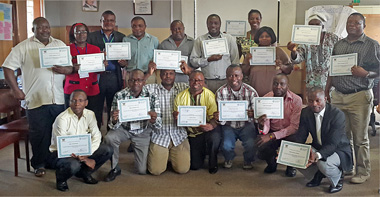 A participatory approach to training introduced participants to the concepts of forest tenure and its reform through simulated exercises, group discussions and field practicals. Topics included the Voluntary Guidelines and principles and practical tools for forest tenure reform. The training ended with participants bringing together the practical exercises and developing action plans to strengthen forest tenure in their countries. The participants represented government, non-governmental and civil society organizations and academia and came from six countries: Ghana, Kenya, Nigeria, Tanzania, Uganda and Zambia. The training was provided in Kampala, Uganda, in November 2015 by FAO in collaboration with Makerere University. The training uses a module to help facilitators of forest tenure processes to identify the needs for strengthening forest tenure systems and governance, and to explore strategies and tools to address these needs. The module was developed by FAO and is based on the Voluntary Guidelines. The training in Kampala was funded by Switzerland. A similar regional training event was held in Bangkok in 2014 for participants from seven Asian countries.
A participatory approach to training introduced participants to the concepts of forest tenure and its reform through simulated exercises, group discussions and field practicals. Topics included the Voluntary Guidelines and principles and practical tools for forest tenure reform. The training ended with participants bringing together the practical exercises and developing action plans to strengthen forest tenure in their countries. The participants represented government, non-governmental and civil society organizations and academia and came from six countries: Ghana, Kenya, Nigeria, Tanzania, Uganda and Zambia. The training was provided in Kampala, Uganda, in November 2015 by FAO in collaboration with Makerere University. The training uses a module to help facilitators of forest tenure processes to identify the needs for strengthening forest tenure systems and governance, and to explore strategies and tools to address these needs. The module was developed by FAO and is based on the Voluntary Guidelines. The training in Kampala was funded by Switzerland. A similar regional training event was held in Bangkok in 2014 for participants from seven Asian countries.
Africa Subregional Exchange on tenure and REDD+
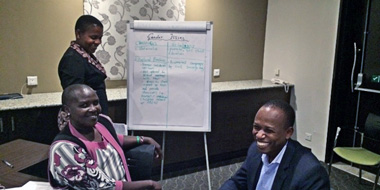 “We need to deal with tenure if we want REDD+ to succeed.” This comment from a participant from Malawi encapsulates a conclusion of an event to exchange knowledge on tenure and REDD+. The event brought together participants from Kenya, Madagascar, Malawi, Uganda, Zambia and Zimbabwe and was held in Lusaka, Zambia in November 2015. The rich discussions and presentations showed common challenges, such as engaging traditional authorities and identifying appropriate strategies to recognize legitimate tenure rights in the chiefdoms. Another challenge is traditional land inheritance that often fails to properly recognize women’s rights, with negative consequences for sustainable forest management. The Voluntary Guidelines were introduced to guide thinking on these complex issues as clear and secure tenure is a fundamental building block for REDD+ strategies and actions. The event was organized by FAO and UN-REDD.
“We need to deal with tenure if we want REDD+ to succeed.” This comment from a participant from Malawi encapsulates a conclusion of an event to exchange knowledge on tenure and REDD+. The event brought together participants from Kenya, Madagascar, Malawi, Uganda, Zambia and Zimbabwe and was held in Lusaka, Zambia in November 2015. The rich discussions and presentations showed common challenges, such as engaging traditional authorities and identifying appropriate strategies to recognize legitimate tenure rights in the chiefdoms. Another challenge is traditional land inheritance that often fails to properly recognize women’s rights, with negative consequences for sustainable forest management. The Voluntary Guidelines were introduced to guide thinking on these complex issues as clear and secure tenure is a fundamental building block for REDD+ strategies and actions. The event was organized by FAO and UN-REDD.
Regional multi-stakeholder consultation on land governance in the Asia-Pacific Region
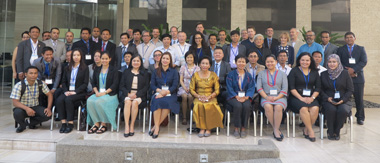 Government and civil society representatives from 11 countries gathered in Bangkok, Thailand, for a regional consultation during 14-16 December 2015. They used interactive sessions to identify ways to promote the exchange of knowledge on land governance and discussed challenges and opportunities to foster improvements. Topics included the recognition of customary tenure and responsible agricultural investment using the Voluntary Guidelines and the Principles for Responsible Investment in Agriculture and Food Systems (CFS-RAI). Enhancing the understanding of the issues of land governance will help in developing ways to move forward. The meeting served to strengthen exchanges on land governance and the priorities identified will guide regional activities. The consultation was technically supported and funded by FAO.
Government and civil society representatives from 11 countries gathered in Bangkok, Thailand, for a regional consultation during 14-16 December 2015. They used interactive sessions to identify ways to promote the exchange of knowledge on land governance and discussed challenges and opportunities to foster improvements. Topics included the recognition of customary tenure and responsible agricultural investment using the Voluntary Guidelines and the Principles for Responsible Investment in Agriculture and Food Systems (CFS-RAI). Enhancing the understanding of the issues of land governance will help in developing ways to move forward. The meeting served to strengthen exchanges on land governance and the priorities identified will guide regional activities. The consultation was technically supported and funded by FAO.
